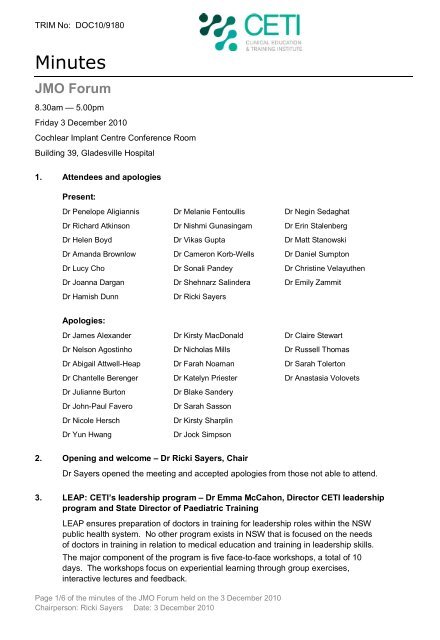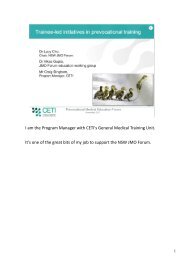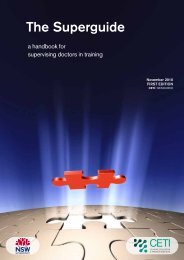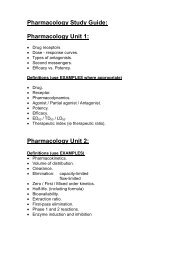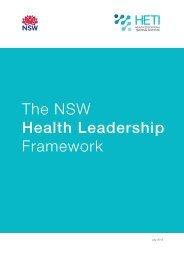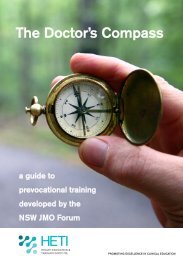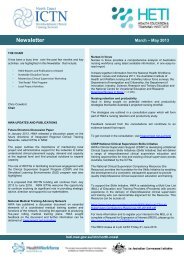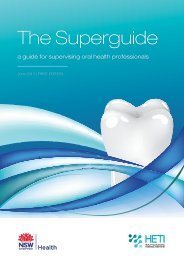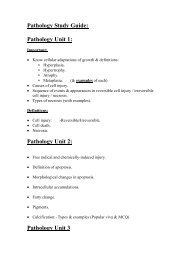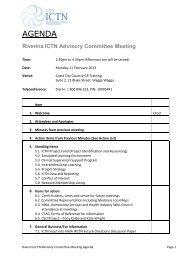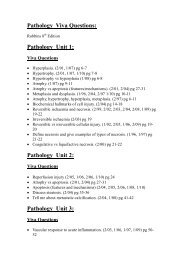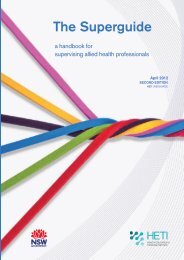Open - HETI
Open - HETI
Open - HETI
Create successful ePaper yourself
Turn your PDF publications into a flip-book with our unique Google optimized e-Paper software.
TRIM No: DOC10/9180<br />
Minutes<br />
JMO Forum<br />
8.30am — 5.00pm<br />
Friday 3 December 2010<br />
Cochlear Implant Centre Conference Room<br />
Building 39, Gladesville Hospital<br />
1. Attendees and apologies<br />
Present:<br />
Dr Penelope Aligiannis<br />
Dr Richard Atkinson<br />
Dr Helen Boyd<br />
Dr Amanda Brownlow<br />
Dr Lucy Cho<br />
Dr Joanna Dargan<br />
Dr Hamish Dunn<br />
Dr Melanie Fentoullis<br />
Dr Nishmi Gunasingam<br />
Dr Vikas Gupta<br />
Dr Cameron Korb-Wells<br />
Dr Sonali Pandey<br />
Dr Shehnarz Salindera<br />
Dr Ricki Sayers<br />
Dr Negin Sedaghat<br />
Dr Erin Stalenberg<br />
Dr Matt Stanowski<br />
Dr Daniel Sumpton<br />
Dr Christine Velayuthen<br />
Dr Emily Zammit<br />
Apologies:<br />
Dr James Alexander<br />
Dr Nelson Agostinho<br />
Dr Abigail Attwell-Heap<br />
Dr Chantelle Berenger<br />
Dr Julianne Burton<br />
Dr John-Paul Favero<br />
Dr Nicole Hersch<br />
Dr Yun Hwang<br />
Dr Kirsty MacDonald<br />
Dr Nicholas Mills<br />
Dr Farah Noaman<br />
Dr Katelyn Priester<br />
Dr Blake Sandery<br />
Dr Sarah Sasson<br />
Dr Kirsty Sharplin<br />
Dr Jock Simpson<br />
Dr Claire Stewart<br />
Dr Russell Thomas<br />
Dr Sarah Tolerton<br />
Dr Anastasia Volovets<br />
2. <strong>Open</strong>ing and welcome – Dr Ricki Sayers, Chair<br />
Dr Sayers opened the meeting and accepted apologies from those not able to attend.<br />
3. LEAP: CETI’s leadership program – Dr Emma McCahon, Director CETI leadership<br />
program and State Director of Paediatric Training<br />
LEAP ensures preparation of doctors in training for leadership roles within the NSW<br />
public health system. No other program exists in NSW that is focused on the needs<br />
of doctors in training in relation to medical education and training in leadership skills.<br />
The major component of the program is five face-to-face workshops, a total of 10<br />
days. The workshops focus on experiential learning through group exercises,<br />
interactive lectures and feedback.<br />
Page 1/6 of the minutes of the JMO Forum held on the 3 December 2010<br />
Chairperson: Ricki Sayers Date: 3 December 2010
Skills learnt in the workshops are complemented and further developed by an ongoing<br />
program of projects completed in syndicate groups, self-directed and web-based<br />
learning, a mentor program and practical leadership experience in the workplace.<br />
The dates for 2011 program will be released on the CETI website shortly.<br />
Group numbers for the program are generally up to 25 people.<br />
As a demonstration of the program, Dr McCahon led a group activity within the JMO<br />
Forum. Groups were asked to work together without using verbal communication to<br />
form paper shapes on their desks. This proved to be both entertaining and<br />
educational, as participants were able to see their own different leadership styles.<br />
Action:<br />
CETI to:<br />
<br />
upload dates for the 2011 Leadership Program on their website.<br />
[Done: see http://www.ceti.nsw.gov.au/lead-and-leap-leadership-developmentprograms/w1/i1002706/]<br />
4. Report from the Australasian JMO Forum – Dr Ricki Sayers<br />
Dr Ricki Sayers presented on the Australasian JMO Forum held in Melbourne<br />
November 2010.<br />
The resolutions of the meeting and related documents are attached to these minutes:<br />
2010 Australasian Junior Medical Officer Forum Report and Resolutions<br />
PMCV JMO Forum & AMA Victoria Doctors-in-training Subdivision: guidelines on<br />
internship mentoring programs<br />
PMCV JMO Forum Guidelines on protected teaching time<br />
NSW JMO Forum proposed lecture series for interns<br />
Implementing electronic discharge summaries: the JMO perspective. A<br />
submission to the National e-Health Transition Authority (NeHTA) prepared by<br />
the Australian Medical Association Council of Doctors-in-Training (AMACDT)<br />
5. Group Workshops<br />
The supervision, handover, welfare and education groups worked on their projects<br />
and a small group reviewed QHealth training vodcasts.<br />
6. Reports from groups (outcomes 2010, plans 2011)<br />
Each workgroup gave a small presentation on what they have been doing for the<br />
year and where they expect to go next year.<br />
Handover group – Dr Hamish Dunn<br />
<br />
The handover group conducted focus group interviews at each of the pilot sites<br />
for the new JMO shift handover process.<br />
Thematic analysis revealed four common themes. (1) Efficiency: JMOs wanted a<br />
time efficient process with senior leadership and a locally appropriate review of<br />
attendance. (2) Tools involved in handover should ensure documentation not<br />
duplication of work, with a dominant focus on patient care not administration. (3)<br />
Education and supervision are the ‘selling points’ of the handover process to<br />
JMOs. They help to instil a strong hospital handover culture. A guide for senior<br />
Page 2/6 of the minutes of the JMO Forum held on the Friday 3 December
clinicians to facilitate JMO handover is suggested. (4) The significant impact on<br />
patient safety and continuity of care was acknowledged at all sites.<br />
<br />
<br />
<br />
The report of the handover group was provided to the Acute Care Taskforce and<br />
has been used in finalising the implementation toolkit and other supporting<br />
documents for statewide implementation of structured JMO shift handover.<br />
The work of the group will be written for publication in the professional literature.<br />
The Handover group will be going into sleeper mode next year, as the project is<br />
complete.<br />
Supervision Group<br />
The Supervision Group conducted a survey online that received a good response<br />
from JMOs.<br />
The presentation of the survey results to date is attached.<br />
<br />
The survey is still collecting responses, and there is a possibility that the results<br />
can be prepared for publication.<br />
It was suggested that a matching survey of supervisors might be informative.<br />
Education Group<br />
<br />
The Education group presented on its proposed unified lecture series for interns.<br />
New lectures on pathology and paediatrics have been added to the series. Topic<br />
outlines for each lecture are being prepared.<br />
Ricki Sayers will compile an online document adding all the working groups<br />
supporting documents with links to specific group documents for everybody’s<br />
information.<br />
<br />
The Education group needs to get the lecture series sent out to hospitals in time<br />
for first term 2011 so it can be implemented.<br />
Welfare Group<br />
<br />
The welfare group has been involved in piloting the peer mentoring project at<br />
three sites.<br />
Evaluating the pilots is a task for 2011.<br />
<br />
The group needs new members: a 50:50 mix of PGY1 and PGY2 is required for<br />
continuity of the group’s projects.<br />
Vodcasts<br />
Dr Amanda Brownlow wrote a statement regarding the Queensland Health JMO<br />
Vodcasts, “Supporting Junior Medical Officers”.<br />
The topics covered are areas of the ACFJD not directly related to clinical learning or<br />
direct patient care. As an educational resource they are inadequate to cover these<br />
ACFJD topics on their own. Additionally, to be useful they would have to focus more on<br />
specific ACFJD topics as an adjunct to other teaching, not just refer to the ACFJD.<br />
Page 3/6 of the minutes of the JMO Forum held on the Friday 3 December
We feel that audiovisual material is a very useful and important teaching and learning<br />
resource. However, these vodcasts are poorly created, artificial, condescending to the<br />
audience for whom they are directed and clichéd. They are ineffective as a teaching tool.<br />
A better resource for example, is the TV show Scrubs, which covers similar issues, but in<br />
a clever and accessible way. Scrubs has been used as a discussion point in JMO<br />
teaching. These vodcasts feel like a bad day-time melo-drama. They need to be more<br />
realistic and applicable to everyday situations for them to be an appropriate and useful<br />
(and actually watched!) resource.<br />
Action:<br />
<br />
<br />
<br />
Supervision group to consider conducting a survey of clinical supervisors.<br />
Ricki Sayers to compile a report on the projects of all the working groups.<br />
Education group to send lecture series to hospitals before term one 2011 for<br />
implementation.<br />
7. Orientation week planning – Dr Lucy Cho, Craig Bingham, Dawn Webb.<br />
Craig Bingham demonstrated a powerpoint presentation that will be used during<br />
orientation week.<br />
8. The TALL MAN project<br />
Daniel Lalor from the Clinical Excellence Commission presented on a project to<br />
investigate typographic methods of preventing drug name confusion (“TALL MAN”<br />
lettering uses selective capitalisation to highlight distinguishing syllables in similar<br />
drug names).<br />
Mr Lalor sought the Forum’s advice on the best method of gathering a large group of<br />
JMOs for testing of possible interventions.<br />
Mr Lalor’s presentation is attached.<br />
9. Between the Flags<br />
Dr Charles Pain and Ms Colette Duff from the Clinical Excellence Commission<br />
presented on the Between the Flags project.<br />
Dr Pain observed that: “Clinicians are against standardisation, but one of the things<br />
that contributes to patient safety is having a standard approach.” He observed that<br />
the younger generation of clinicians were more positive about standardisation.<br />
A free-ranging discussion of the effect of “Between the Flags” followed.<br />
JMOs reported issues with being called every time a patient reaches the yellow zone:<br />
eg, the patient’s blood pressure drops by one point with no other issues being<br />
present. They feel the nurses rely too much on the black and white of the forms. Dr<br />
Pain: “standardisation and clinical judgement are not opposed to each other.” It was<br />
suggested that there was a learning period involved and that the correct<br />
interpretation of the “Between the Flags” guidelines would take time to learn.<br />
Dr Pain said that there were 65,000 NSW Health staff to train in the DETECT program<br />
for managing the deteriorating patient — a project that would clearly take some time.<br />
Dr Pain’s presentation is attached.<br />
10. Pre-surgical training in New South Wales<br />
Page 4/6 of the minutes of the JMO Forum held on the Friday 3 December
Dr Kerin Fielding and Dr Chaminda Wijeratne presented on CETI’s pre-surgical training,<br />
a flexible training program designed to address a gap in education in NSW public<br />
hospitals. It offers higher quality and safer care for patients because doctors will have<br />
the education and support to enable them to do their jobs well.<br />
The surgical skills training course run within the program costs $2500 and runs for 2<br />
weeks 2 days, directly before the college exam. Further details are available on<br />
CETI’s website.<br />
11. TAG- Therapeutic Advisory Group – Erin Stalenberg<br />
Erin Stalenberg reported on her involvement with TAG:<br />
I have been one of the "Expert Advisory Committee" for the NSW Therapeutic Advisory<br />
Group's current project - advising on Quality Use of Medicines Program with specific<br />
reference to medications in hospital discharge summaries. The panel is made up of<br />
Hospital Consultants, Pharmacists, Pharmacologist, a community GP and me a JMO,<br />
representing the people who actually write the D/C summaries!<br />
A pilot project is being rolled out at 16 sites across NSW (public and private<br />
hospitals) which will analyse the discharge summaries of medical patients with particular<br />
reference to the medications (ie, if they are on the D/C summary, if changed or ceased<br />
medications have been included, reasons for changes etc). This analysis will be followed<br />
by an intervention strategy which will involve JMO education, hospital wide promotion and<br />
patient targeted education.<br />
The Panel has been advising on tools and interventions to include in the strategy. JMOs<br />
across NSW can be advised to be on the lookout for such projects in their own hospitals<br />
and look forward to increased knowledge and awareness for this important<br />
communication tool - the hospital discharge summary.<br />
That's all for now! Meeting again in early 2011<br />
12. CETI update - Craig Bingham<br />
Dr Sonali Pandey did a lecture at the AMC orientation where two new reps will be<br />
required for next year.<br />
Craig Bingham asked for suggestions for a new name for the NSW Prevocational<br />
Forum, due to there being too many forums. Some of the suggestions raised were:<br />
<br />
<br />
<br />
Congress<br />
Symposium<br />
Summit<br />
Prevocational Mash Up<br />
The forum was asked whether they thought CETI should be on social networking<br />
sites. The response was unenthusiastic. Comments:<br />
<br />
<br />
Unprofessional<br />
We are not allowed facebook at work – sends the wrong message for CETI to be<br />
on facebook<br />
Facebook is for social life, not work communications<br />
<br />
Public social networking is not an appropriate channel for clinical information. For<br />
instance, it is not appropriate to put clinical training material on youtube where it<br />
can be accessed by non-doctors.<br />
Page 5/6 of the minutes of the JMO Forum held on the Friday 3 December
A wikipedia entry on CETI would be appropriate<br />
13. CETI’s Hospital Skills Program – Alpana Singh<br />
Alpana Singh presented on CETI’s hospital skills program. See attached presentation.<br />
14. Issues affecting prevocational training<br />
The forum held an open discussion on some of the issues affecting prevocational<br />
training.<br />
People leaving their contracts early. Many PGY2s resign before the end of term 5,<br />
often after giving the minimum required notice. We need to find out why people are<br />
leaving in large numbers in PGY2 term 5 and find positive methods to reduce the<br />
problem. It was acknowledged that PGY2s leaving early made life more difficult for<br />
those remaining, but opinions differed on the appropriate response. Some thought<br />
that the problem should be solved by hospitals hiring more PGY2s in the first place,<br />
or being more willing to hire temporary staff (eg, backpacker doctors from the UK).<br />
Others thought that some pressure or incentive should be brought to bear on PGY2s<br />
to encourage them to stay. There was some support for the introduction of a<br />
certificate of completion to be awarded to PGY2s at the end of term 5, but others<br />
thought that this represented a punishment of those who left before the end of the<br />
year, who might have good reasons for doing so.<br />
<br />
Term dates across the nation do not match up, thus making it hard for those that<br />
wish to move interstate to complete their prevocational training. Term dates<br />
should be made the same nation wide.<br />
JMO reps feel there should be more flexibility within the workforce.<br />
15. Planning for 2011<br />
Dr Lucy Cho led a discussion of plans for 2011.<br />
Working groups:<br />
Education: continuing<br />
Supervision: continuing<br />
Welfare: continuing<br />
Assessment: merge with Education or Supervision<br />
Handover: not continuing<br />
Training: to work on an ongoing information pack for JMOs about vocational<br />
training options, courses, admission requirements, recognition of prior learning<br />
and similar issues.<br />
A communications team with representation from each working group should<br />
consider the best methods of communicating the activities of the JMO Forum to<br />
JMOs and the rest of the health system.<br />
Next meeting<br />
The next JMO Forum meeting is scheduled for;<br />
Friday 11 March 2010<br />
Sydney Cochlear Implant Centre Conference Room, Building 39, Gladesville Hospital<br />
Page 6/6 of the minutes of the JMO Forum held on the Friday 3 December


